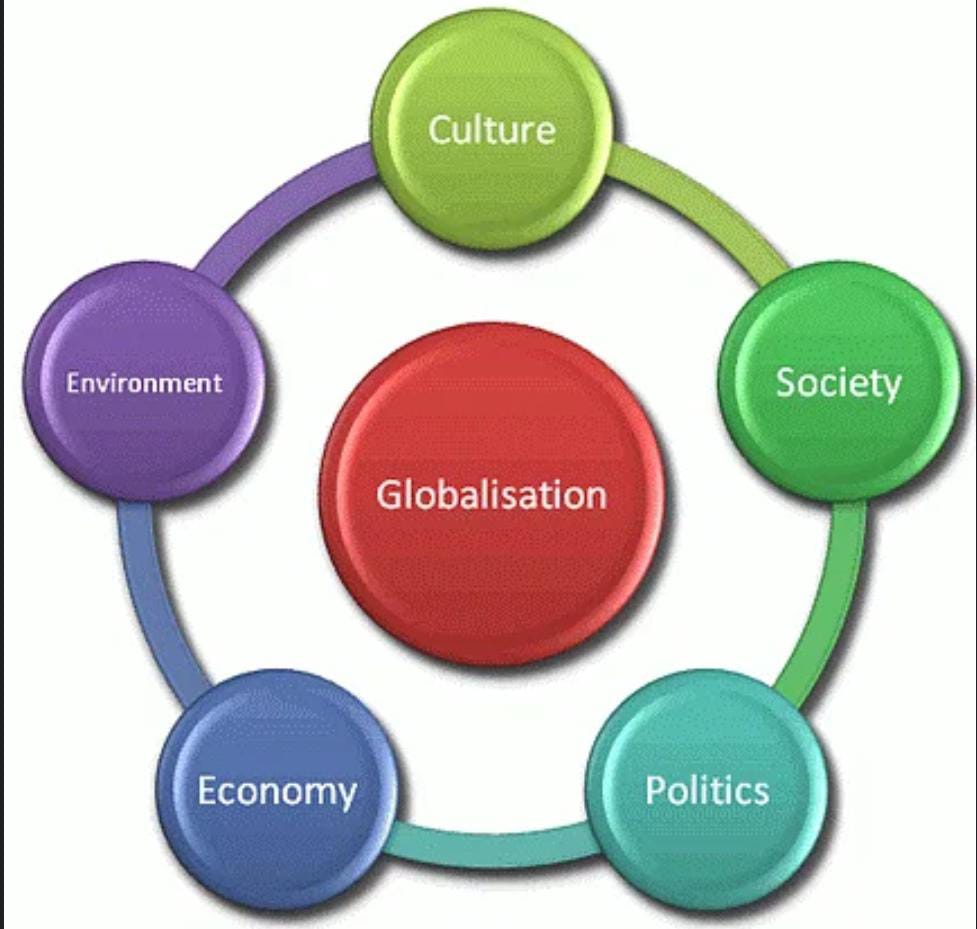One cannot ignore the effects of globalisation on the environment, as it puts the quality of life at stake. To improve environmental quality and achieve net-zero emissions, the government needs to implement policies that focus on environmental protection. Conservative policies often focus on only the exchange of resources and profit-oriented activities, which ensure financial relationships, ignoring the awareness of quality living.
However, the pace of globalisation can be steered to make statistical significance in terms of more countries ensuring the usage of renewable energy capacity. Let us know in detail how the challenges of globalisation can be overcome to enhance the quality of life we live in.

Table of Contents
What is Meant by Globalisation?
Globalisation is like a network connecting the world through economic integration, political integration, information technology, and cultural exchange. This trend towards globalisation was initiated in the last decade of the 20th century. This ongoing process of global integration increases with the rising number of nations and areas becoming politically, culturally, and economically connected.

What are the Effects of Globalisation?
Globalisation has spread its venture in every other aspect of the world. Sometimes, it creates a positive impact on the quality of life. At other times, the negative effects have a deep and long-lasting impact. Let us know both of the influences of globalisation one by one:

Positive Effects of Globalisation
- Economic Growth: Globalisation has led to the economic growth of many countries that were below the poverty line. This has led to open business and easy exchange of goods, labor, and raw materials. This economic development, in turn, has led to a strong global financial market, industrial development, and advancement through state-of-the-art technologies.
- Cultural and Social Benefits: Globalisation has led to social development, as people can travel or migrate for work or pleasure without barriers. The intermingling of people across the globe has led to the exchange of culture, food, clothes, and even beliefs.
- Environmental Quality: Globalisation leads to the transfer of capital goods and technologies, so it can also facilitate the transfer of environmentally friendly technological innovations. Multinational firms that use cleaner energies than local firms can spread their clean, state-of-the-art technologies to countries with low environmental standards.

Negative Effects of Globalisation
- Economic Impacts: While globalisation has enhanced a strong global market and state-of-the-art technologies, the economic environment does not work in favour of all countries. This is because income inequality, disproportionate trade benefits, and unequal distribution of wealth are some of the aspects that have widened the gap between poor and rich countries.
- Environmental Impacts: Globalisation has led to increasing global demand, which results in increasing production. This leads to adverse effects on the environment and the exploitation of natural resources.

What are the Positive Effects of Globalisation on the Environment?
Since environmental damage is a burning issue today, knowing about the effects of globalisation on the environment also holds significance. The greatest challenge faced by the world is the increasing CO2 emissions, which are depleting the ozone layer. A report by the International Transport Forum estimates that the carbon emissions emitted from transport will increase by 16% in 2050.
Globalisation can be seized as an opportunity to prevent environmental damage by using effective environmental policies. Businesses and industrial structures can be remade with greener infrastructures and equipment to reduce the use of non-renewable resources and, hence, energy consumption. Most importantly, raising awareness among employees about environmental protection and reducing the use of fossil fuels can be an essential step towards maintaining environmental quality.

Upper middle-income countries can now manufacture eco-friendly products that reduce CO2 emissions with the help of energy-efficient technologies facilitated by international trade. Considering the positive effects of globalisation on the environment, one can reduce carbon dioxide emissions, which is an essential step towards improving the quality of life.
For instance, the Chinese government has shifted from being the main producer of greenhouse gas emissions to becoming the global leader with a direct investment in preserving the natural environment. Achieving net zero emissions is the main aim of the entire world, but the US’s continued production of fossil fuels seems to have a negative impact on environmental quality.
What are the Challenges to the Effects of Globalisation on the Environment?
Globalisation has a positive impact on enhancing the economic environment, but the negative effects of globalisation on the environment are undeniable. Globalisation leads to a rise in global competition and an increase in economic activities, which creates a negative impact on environmental standards. Let us know what are the challenges to the effects of globalisation on the environment:

- In the bid of competition, international firms often go for cost-saving production techniques which do not maintain environmental quality.
- There is a direct relationship between trade and the environment because increasing international trade of raw materials and finished products leads to more transport usage, which in turn leads to the overuse of fossil fuels and more CO2 emissions.
- Globalisation, through increased international trade, is responsible for soil, air, and water pollution. Forests are cleared for industrial development, and factories emit their wastes into waterways or the open air.
- Deforestation is a direct fallout of globalisation. Land clearing and logging reduce the volume of carbon dioxide in the atmosphere, which is converted into oxygen by plants. This equivalent increase in the volume of carbon dioxide in the atmosphere contributes to the degradation of environmental quality.
- Excessive fishing in coastal areas has caused marine pollution and reduced fish populations. Globalisation has also led to excessive focus on cash crop growth, contributing to habitat loss.
- Globalisation and environmental laws have led to the uneven distribution of environmental damage, such as landfills and chemical plants, and environmental development, such as protected water bodies and open spaces. Moreover, greenhouse gas emissions reduce global biodiversity.

What are the Solutions to the Effects of Globalisation on the Environment?
Despite globalisation having a far-reaching impact on environmental standards and natural resources, it is better than deglobalisation. Instead of reducing greenhouse gas emissions, the reverse of globalisation will halt the adoption of environmentally friendly activities. Therefore, environmental justice advocates propose to retain globalisation and its technological advancement with certain modifications. These are:
- Deglobalisation hinders the easy exchange of environmental technologies. Therefore, globalisation should be encouraged to strengthen the relationship between trade so that third-world countries benefit from go-green environmental policies and state-of-the-art technologies.
- The estimation made by the KOF Swiss Economic Institute in 2020 concluded that the increasing social globalisation, political globalisation and economic globalisation lead to better environmental standards.
- Proper government implementation, such as creating a robust energy infrastructure, can seize the positive effects of globalisation on the environment.
- In post-pandemic situations, governments should take proactive steps to ensure that globalisation leads to the spread of knowledge and awareness about communicable diseases and how they can be prevented in future.
- Another way to overcome the challenges posed by globalisation is for governments to be vigilant about environmental protection, as trade activities directly impact environmental quality.

Conclusion
Thus, it can be concluded that the government should take into consideration the positive effects of globalisation on the environment. This is because the reversal of globalisation would lead to greenhouse gas emissions and exploitation of natural resources. In the pursuit of profit-oriented activities to increase per capita income, one should not ignore environmental protection. This is because depletion of the ozone layer would lead to adverse effects on the quality of life.
Therefore, government implementation should centre on environmentally friendly activities and renewable energy technologies. These should not remain confined to upper-middle-income countries but spread throughout the globe with the help of globalisation.

FAQs
What are the 4 Effects of Globalisation on the Environment?
The four negative effects of globalisation on the environment are deforestation, marine pollution, depletion of natural resources and emissions of greenhouse gases.
Does Globalisation Increase Emissions?
Globalisation causes emissions due to profit-oriented activities, but it can also be used to steer environmental art technologies or environmental policies to ensure net zero emissions.
What are Examples of Environmental Emissions?
Environmental emissions include greenhouse gas emissions, mainly carbon dioxide, sulphur dioxide and carbon monoxide.









